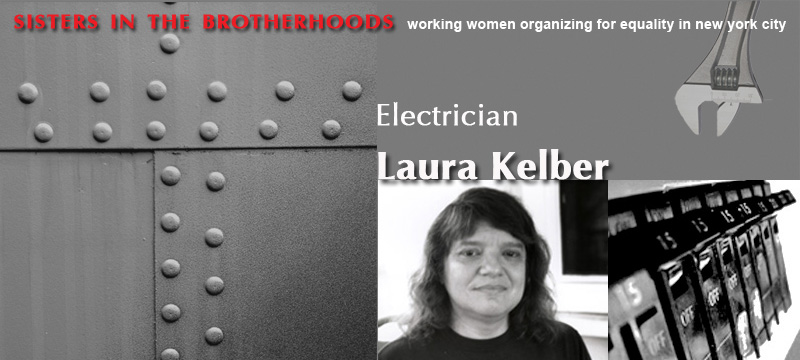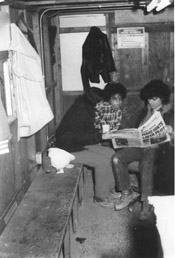 |
||||||
|
||||||
|
A Brooklyn native, Laura Kelber is the daughter of labor journalists who were blacklisted during the McCarthy period. Her father then joined the International Typographers Union and worked as a linotype operator for the New York Post. Laura was greatly influenced by her mother, Miriam, an ardent feminist who worked part time as an editor for medical publication.
Kelber graduated from Yale University in 1979 with a degree in political philosophy and then began job hunting. Her mother's friend Joyce Hartwell, founder of the All-Craft Center, invited Kelber to join the program that introduced women to the skilled trades. Her first job in the trades was as a cement mason apprentice on a crew that was redoing the street islands in Jamaica, Queens. However, Kelber was most interested in the electrical trade. Her father, the former director of the Educational and Cultural Fund of the Electrical Industry, offered to contact Harry Van Arsdale, Jr., leader of Local 3 (IBEW) on her behalf. Kelber refused, insisting that she would go through the application process like everyone else. She was one of thirty women admitted to the local's apprenticeship program that year. She joined Local 3 and started working in March 1981 at Battery Park City, a huge planned development under construction at the southwestern tip of lower Manhattan. Kelber, Evan Ruderman, and Brunilda Hernandez were among the other women there. Kelber's foreman immediately assigned her to "the mill," a huge shed where pipe was cut to spec. She discovered that religious and ethnic racism influenced assignments: Jewish workers were sent to the mill, black workers were given the boiler room, and the high-prestige job—the fire alarm system—went to the Irish. Like other women, she experienced taunts from her male coworkers, but she also had many positive experiences on the job. In the evenings she attended the apprentice school, where women were a tiny minority. Kelber first met Cynthia Long there, and the two became good friends. They shared a common interest in organizing and devoted considerable time and energy to Women Electricians. After becoming a journeywoman, Kelber crusaded on behalf of a woman's right to be pregnant on the job. Pregnancy crystallized the issues surrounding women working in nontraditional blue-collar jobs. Time-honored protective practices in the construction industry—"covering" for sick coworkers, "set-asides" for men age 55 and older, and light duty for disabled electricians—were not extended to women. She unsuccessfully tried to resolve these problems through the union. After suffering two miscarriages, she took the Joint Industry Board (JIB) to court over the issues of pregnancy disability, pregnancy leave, light duty, and related matters. She lost the trial but won an appeal and the right to a second trial in 1994. The JIB settled outside of court, but it was forced to change its policies or risk future litigation. Kelber paid a steep price for her noncompliance. She was not welcomed when she returned to work after the court case, and she subsequently left the industry in 1998. She earned a master's degree in environmental health and worked in the field for a time. In recent years she has been pursuing her interest in screenwriting. She is the mother of three young adults. In her oral history Kelber relates the story of her struggle to extend protective practices to include pregnant workers. She also discusses such matters as sexual harassment on the job and her disappointment over the lack of mutual support among women in the union. |
|||||
| ||||||
Copyright 2011 Jane LaTour/Talking History |
||||||
